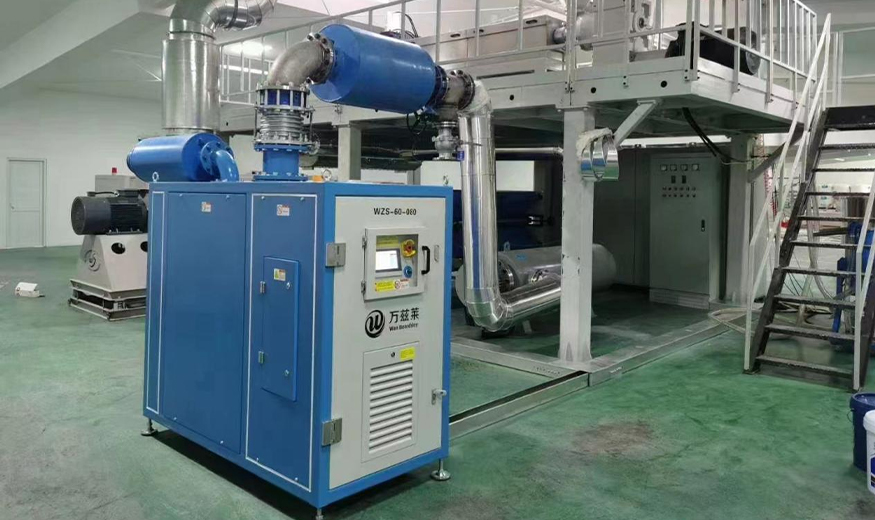Do your screw air compressors have problems such as high exhaust temperature, reverse oil spray, and insufficient air volume?
Do your screw air compressors have problems such as high exhaust temperature, reverse oil spray, and insufficient air volume?
Let me tell you the solution.

l High exhaust temperature
Under normal operation, if the temperature sensor switch or temperature display of the compressor fails, it can result in the protective device not functioning properly, leading to oil degradation.
(1) Oil separator failure
The oil separator separates compressed air and oil in the unit. If it malfunctions:
(a) If the oil separator is blocked, it increases compressor running resistance and energy consumption, causing high temperatures in the unit. Cleaning can be applied for blockages, and severe cases may require oil separator replacement.
(b) If the oil separator is punctured or damaged, it increases oil consumption and temperature, leading to elevated exhaust temperatures. Prompt replacement of the oil separator is necessary in such cases.
(2) Oil filter blockage
The oil filter removes metal particles and impurities from the compressor's specialized oil to keep the oil entering the main engine clean, ensuring safe operation. Blockage can result in high exhaust temperatures and shorten the lifespan of the oil and oil separator. If cleaning doesn't restore functionality, timely replacement is recommended.
(3)Pressure valve stuck
The minimum pressure valve ensures normal lubrication of unit components during compressor startup, maintains oil pressure at the minimum value for optimal oil and air separation, and prevents compressed air backflow during idle or shutdown. If the valve is stuck and cannot open or fully open, it causes increased oil bucket pressure, energy loss, and elevated exhaust temperatures. Remediation can be done through inspection or replacement.
(4) Oil cutoff valve stuck
The oil cutoff valve in the unit plays a crucial role in connecting the oil circuit system during operation, ensuring smooth circulation of the oil. Therefore, if the oil cutoff valve malfunctions and cannot open or fails to fully open, it results in lubricating oil not smoothly entering the compressor head. This, in turn, causes insufficient oil return, leading to elevated temperatures in the unit and an increase in exhaust temperatures.
l Oil spray during unit shutdown
(1) Inlet valve failure to close
If the inlet valve fails to open, it affects the compressor's gas production. If there's a malfunction, relevant components of the inlet valve need inspection or replacement.
(2) Minimum pressure valve malfunction
When the minimum pressure valve fails to close, the compressor cannot load properly, causing gas to flow back into the oil bucket during shutdown and resulting in oil spray.
(3) Check valve (one-way valve) malfunction
The check valve prevents oil from flowing back into the head during shutdown, preventing oil spray. If the check valve does not close tightly or cannot close, its protective function is compromised, leading to oil spray. Immediate replacement is necessary upon detecting a malfunction.
(4)Oil cutoff valve stuck
The oil cutoff valve ensures the oil circuit is disconnected during shutdown. If it fails to close, it causes oil spray during unit shutdown. Prompt inspection and maintenance of the oil cutoff valve are recommended.
l Insufficient gas production during unit operation
(1) Air filter element blockage
A blocked air filter element leads to inadequate unit exhaust volume. In such cases, the air filter element can be removed and cleaned with compressed air or replaced directly.
(2)Minimum pressure valve stuck
When the minimum pressure valve fails to open or does not fully open, gas production is significantly reduced. Inspection, maintenance, or replacement of spare parts can address this issue.
(3) Inlet valve not fully open
If the inlet valve fails to open or does not fully open, the compressor cannot achieve normal gas production. Clearing control air pipes, inspecting and maintaining the loading solenoid valve, checking for air leaks in control air pipes, lubricating the control cylinder and its connecting rod mechanism, and inspecting insufficiently open butterfly valves are recommended. For volumetric intake valves, checking for piston air leaks, spring integrity, and replacing piston, spring, and sealing components as needed or directly replacing the intake valve are advised.
(4) Loading solenoid valve failure
If the loading solenoid valve cannot operate normally, it directly affects the compressor's gas production and causes overcurrent during operation, leading to motor overload.
Regular and diligent maintenance is crucial for the proper functioning of screw air compressors. Feel free to leave a message to discuss any issues you may be facing.







